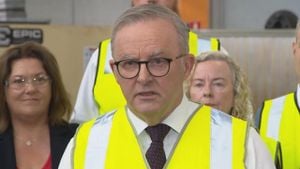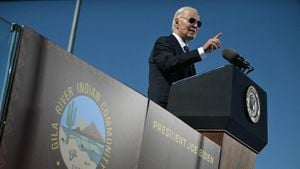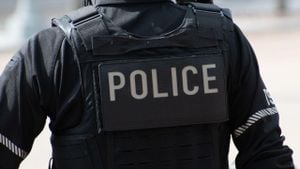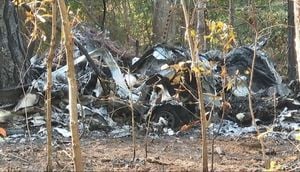Gun violence struck the Jewish community of West Rogers Park once again, igniting fears and calls for justice after 39-year-old Elimelech Schwartz was shot on his way to synagogue. The October 27 incident, which left Schwartz injured, has sparked outrage and confusion as authorities investigate the suspect's intentions.
The man accused, 22-year-old Sidi Mohamed Abdallahi, opened fire without warning, allegedly targeting Schwartz, who was dressed traditionally, including wearing his kippah. This brazen attack came on the heels of heightened tensions surrounding antisemitic violence, causing alarm among local leaders and residents.
"When you have someone who is visibly Jewish and is shot simply for being Jewish, it's terrifying to our community," stated Rabbi Levi Mostofsky, expressing dissatisfaction with the lack of immediate recognition of the potential hate crime aspect of the incident.
After the initial shooting, things escalated dramatically. Responding police officers and paramedics faced gunfire from Abdallahi, who aimed at them as they arrived on the scene. Fortunately, none of them were injured, but the subsequent firefight left Abdallahi critically wounded as police returned fire.
Abdallahi was hurried to the hospital, where he is still being treated. He has been charged with multiple felonies, including six counts of attempted first-degree murder. The case's detention hearing, originally set for this week, has been pushed back as he remains unable to attend due to his injuries.
This latest act of violence has left the Jewish community rattled, especially during the Jewish High Holiday period when people typically feel vulnerable to acts of hate. David Goldenberg, the Midwest regional director for the Anti-Defamation League, echoed these sentiments, highlighting the heightened fears within Jewish families. He noted the troubling statistics, indicating antisemitism has sharply increased in the area, with reports showing nearly 300% more incidents year-over-year.
Mayor Brandon Johnson expressed his thoughts and prayers for the victim but has faced scrutiny from community leaders for not taking stronger public action. Calls have mounted for the city to act and investigate the motives behind the shooting thoroughly. Alderman Debra Silverstein, who attended synagogue with Schwartz, has been pushing for hate crime charges to be filed against Abdallahi, emphasizing the community's right to feel safe and secure.
The police have not yet confirmed if the shooting was motivated by hate, and Abdallahi's potential motives remain unclear. While some eyewitness accounts suggested he made incendiary comments during the incident, the absence of concrete evidence has complicated any claims of bias crimes being committed. Police Superintendent Larry Snelling stated, "We are still gathering evidence. Until we have those facts, we will not announce charges. It's about what we can prove at this time based on collected evidence."
This incident has compelled local Jewish organizations to gather and demand stronger measures to combat antisemitism and protect their communities. Leaders convened press conferences, urging both law enforcement and community members to remain vigilant and take actionable steps to support safety measures. Rabbi Soroka noted the difficulty of shaking off the trauma of such events, especially when children are involved. He mentioned, "What if his daughter had been walking with him? Just think about it."
Despite the press coverage, the community's mistrust about the effectiveness of local authorities persists. Activist leaders want to see visible action taken against hate crimes to rebuild trust and safety. The Anti-Defamation League's data reflects this urgency, showing antisemitic incidents making up over 15% of hate crimes, even though Jewish individuals comprise merely about 2% of the population.
Chicagoans have been waiting for the justice system to respond meaningfully, to not only punish the wrongdoers but also prevent future incidents. The courthouse awaits Abdallahi's upcoming court date on November 7, where he may face additional charges depending on the coursing investigations. Community leaders remain hopeful yet wary of the public handling of their safety. Each gathered press coverage seems to echo the same call to action: enough is enough.
With winter approaching, local leaders are pressing for heightened security measures and increased collaboration with the Chicago Police Department. It is their hope—even amid these challenging times—that trust and community cohesion can flourish, allowing all residents to feel safe, irrespective of their faith or backgrounds. The community's unwavering spirit shines through, shining light on the need for change and advocacy for peace amid fears of violence.
Collectively, the Jewish community acknowledges their resilience, but they also express discontent over the persistent pattern of violence aimed at them. They are calling for accountability, with many urging the police and mayor's office to take their concerns more seriously and affirmatively address hate crime initiatives. Until the investigation unravels the truth, fear continues to loom over the community, but faith persists to guide them forward.



